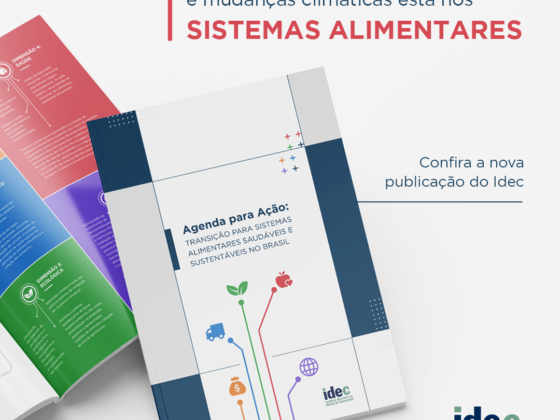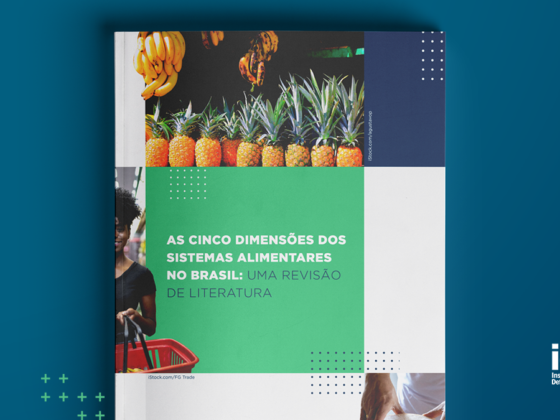Responding to Idec´s lawsuit, trial court in Brazil stands up against corporate capture on FOPWL deadline implementation
The trial court in Brazil issued a ruling granting the preliminary injunctive in a public civil action filed by Idec challenging RDC No. 819/2023 issued by ANVISA that amended RDC No. 429/2020 on front-of-package warning labeling (FOPWL), postponing the deadline for companies to comply with FOPWL requirement.

On February 14, 2024, the trial court in Brazil issued a ruling granting the preliminary injunctive in a public civil action filed by Idec (Brazilian Institute for Consumer Defense) challenging RDC No. 819/2023 issued by the Brazilian National Health Surveillance Agency (ANVISA) that amended RDC No. 429/2020 on front-of-package warning labeling (FOPWL), postponing the deadline for companies to comply with FOPWL requirement.
The ruling suspended the effects of RDC No. 819/2023, ordering ANVISA to refrain from adopting measures that directly or indirectly authorize non-compliance with the implementation deadlines of RDC No. 429/2020 and IN No. 75/2020 and determining that UPP manufacturing companies that are benefited by the authorization extended by RDC No. 819/2023, within a period of 60 days, use complementary adhesive labels with the text “high in” and the new nutrition facts, in accordance with RDC No. 429/2020, under penalty of fine.
According to the trial court, the need “to resist the lobby of economic agents who try to compensate for their own incapacity through state protectionism that harms the community, whether in relation to consumers or in terms of delaying the prevalence, in the economy, of companies with greater agility, efficiency, productivity and adaptability.”
Also, the preliminary injunctive highlight “[t]he abrupt loosening of the rules contributed not only to worsening the informational asymmetry, as it neutralizes the possibility of consumers being better informed (and, therefore, aware) of the characteristics and potential harmful effects on health of products placed in market, but ends up disregarding the health issue of those people who will consume the products.”
For lawyer Leonardo Pillon, from Idec’s Healthy and Sustainable Food Program, the ruling is a very positive response in order to neutralize political influence strategies used by the regulated economic agents to take control over regulatory decisions for themselves.
“For us, there was a violation of the principle of administrative morality in submitting Anvisa regulatory function to the interests of the industry, as we had already warned last October. This situation is extremely damaging to the reputation of an agency known for being technical and independent. There is a double loss of the agency’s credibility: internal, by having disregarded the positions of its own technical area, and external by having suppressed social participation. In any case, this ruling demonstrates that the lobby of regulated corporations and their coalitions, among others, needs to be properly purged by the legal-institutional system in face of the democratic deficit resulting from these activities”, says Pillon.
For Idec’s lawyer, the preliminary decision consolidates the right of consumers to make better informed choices about the potential harmful effects on health arising from the consumption of ultra-processed and processed products with the FOPWL.
Understanding the facts
On October 9, 2023, ANVISA published RDC No. 819/2023 that amended RDC No. 429/2020 and Normative Instruction No. 75/2020, which mandated FOPWL and established its requirements. Resolution No. 819/2023 allowed companies to exhaust their stock of packages and labels acquired before August 8, 2023, until the new deadline of October 9, 2024.
Resolution No. 429/2020 came into force 24 months after its publication and provided a transition period that allowed for 12 months for compliance for certain products already on the market.
Therefore, the ultra-processed and beverage industry had 36 months to adapt to RDC No. 429/2020, after it was approved and published in October 2020. RDC No. 429/2020, once in force, was immediately applicable for products that were new to the market, and it authorized the use of complementary adhesive labels for companies to adapt to the new nutritional information required by the FOPWL mandate.
The process of modifying the main FOPWL resolution occurred without complying with transparency and procedural requirements that rule ANVISA’s regulatory powers, breaching key public interest principles.
RDC No. 819/2023 was published on the last day of the adaptation period mandated by RDC No. 429/2020, and it authorized the exhaustion of packaging and labels that did not comply with FOPWL until a year later, October 2024.
Incorporation of industry interference concepts
Additionally, the complaint incorporates a glossary with terms such as corporate capture, ultra-processed products, ultra-processed food and beverage industry and corporate political influence. As corporate capture, the complaint includes the privileged access that businesses and industrial groups have to policy decision-makers and that does not occur in a transparent and public manner. The most common result of corporate capture is that policies end up protecting industry’s interests. The complaint mentions that corporate capture practices are often legal but undermine the public trust in institutions.
The complaint includes information from documents that IDEC obtained in response to several FOIA requests, such as minutes from various meetings held between the industry and ANVISA’s authorities in which the lack of interest to comply with FOPWL was expressed. Another interesting fact that was identified by IDEC in the minutes is that the Deputy Director of ANVISA’s 5th board had acknowledged that only the collegiate board could modify the FOPWL regulations, as opposed to what ended up happening with RDC No. 819/2023, that was approved by the president director, in a “monocratic” manner.
IDEC also had access to some of the requests that we filed by the industry, such as the one filed by the company of UPP which was subjected to a technical analysis from ANVISA’s internal areas and ended up being rejected. IDEC had also access to the decision of ANVISA’s internal areas in which it is explicitly stated that a deadline extension cannot be granted because it would imply a privileged treatment for certain companies, and due to the detrimental effect an extension would have on consumers’ health and their right to nutrition.
Data on the specific dates and times in which certain documents were signed by ANVISA public officials is relevant to support the claim that the procedure in which RDC No. 819/2023 was approved, was processed in an unreasonably expedited manner.
Industry actions as the deadline mandated by RDC No. 429/2020 approached
As October 2023 approached, the industry intensified its actions to influence ANVISA. Some of the actions that IDEC reported in its complaint as corporate capture that occurred through the industry’s political influence are:
- Meetings of various industry-led and industry-integrated associations with ANVISA to pressure Directors to extend deadlines to RDC No. 429/2020. The complaint lists the associations that participated in those meetings, ANVISA’s representatives, and some of the specific industry’s requests, such as modifying ANVISA’s application guide on RDC No. 429/2020.
- Submission of 57 requests asking for exhaustion of labels and packages in non-compliance with RDC No. 429/2020.
- Filing two writs of protection (or appeals for protection) on the evening before the adaptation period ends.
Manipulation of Anvisa by private interests of regulated economic agents
The civil public action states that after the publication of the 2nd Edition of the Questions and Answers Guide on RDC No. 429/2020, from Anvisa, seven ultra-processed products industry associations met with the agency’s technical areas on 06/01/2023. One of the sector representative mentions that there was a divergence between the Agency understandings presented there and those agreed by the sector, “so that food ingredients that the sector understood were not considered as a source of added sugars by legislation were thus pointed out in the guidance document”.
Due to this opposition, the representative expressly request the agency to change its own technical understanding on this issue to avoid problems such as requests for extension of deadlines, requests for packaging to be exhausted and and other deleterious impacts on the implementation of the standard, demonstrating that there would be strong opposition from the ultra-processed and processed products industry in complying with the obligations to adapt labels with the end of the adaptation deadlines.
In the last days of the label implementation deadline, between 10/01/2023 and 10/09/2023, the food industries presented 50 requests for packaging exhaustion in disagreement with RDC 429/20 and IN 75/20, with deadlines ranging from days to the year 2048. The other request was that Anvisa extend the deadlines for adapting RDC No. 429/20.
On 10/06/2023 at 5:10 pm until 5:30 pm, representatives of the Anvisa Board of Directors participated in a meeting, via Microsoft Teams, with representatives of the food industry association to discuss the flow of packaging that does not comply with RDC 429/2020. The Director of Anvisa requested systematized information from the association itself regarding requests for packaging depletion presented to the agency.
On that same day, 10/06/2023, the same Anvisa representatives who participated in this meeting adopted two administrative acts: (i) the Fourth Board forwards to the Second Board, creating a new regulatory process, a consolidated list with 57 requests for packaging exhaustion received by 10/06 and informs that it would also respond to the requests before the deadline which would occur on 10/09/2023; (ii) the Second Board inserts a new draft resolution of the collegiate board in process SEI nº 25351.906974/2017-04, in which RDC 429/2020 and IN 75/2020 had previously been approved, such draft is signed on the 9th /10/2023 receiving the numbering as RDC nº 819/2023.
According to the trial court, based on 57 (fifty-seven) requests submitted by companies interested in the exhaustion of packaging in disagreement with RDC nº 429/2020, on 10/06/2023, on the eve of the end of the deadline for adapting to the new rules, a the administrative procedure. After just 3 (three) days, on 10/09/2023, the Rapporteur voted to disregard each individual request and, ad referendum from the President of Anvisa, to grant the entire sector an additional period of 12 (twelve) months to companies promoted the exhaustion of “old” packaging that they still had in stock.
“Furthermore, the aforementioned change represents an unexpected change in the ‘rules of the game’, which, as already mentioned, are collectively harmful in the long term due to the loss of credibility of the neglected economic agents (those who tried to prepare themselves for the new system ) in the legal-institutional system. Sudden regulatory changes are always harmful to the economy as a whole, even though they may represent a momentary “lifeline” for less capable economic agents”, states the judicial rule from 13th Civil Court of Federal Justice from São Paulo.
The preliminary injunction is provisory and still can be revised if Anvisa appeal.
About Idec
Idec is an independent non-profit and non-governmental consumers’ rights association founded in 1987. Idec’s mission is to orient consumers, raise their awareness, and defend their rights in relation to potentially harmful products and practices. Idec is funded by private donations and philanthropic support, without any ties to particular private suppliers of products or services.
To fulfill its mission, Idec publishes news and information on its website for consumers, conducts research and studies evaluating products and services, advocates for the adoption of consumer-protecting norms and practices, and engages in legal strategies before Brazilian courts to defend consumers’ collective rights. One of the key legal strategies Idec uses is the public-interest civil action (ação civil pública), a mechanism that enables the defense of collective rights implicating constitutional and statutory rights.
Idec’s “Healthy and Sustainable Foods” (Alimentação Saudável e Sustentável) program defends the right to adequate and healthy foods as a means to promote and protect the population’s health and the environment. Focused on the prevention of non-communicable chronic diseases (like cancer, diabetes, and heart disease), the program works to develop and advocate for the implementation of public policies that ensure the right to consumer information, encourage better business practices and promote environments that are favorable to adequate and healthy foods, especially with regards to advertising and labeling, access to organic food, and the risks of using pesticides.



